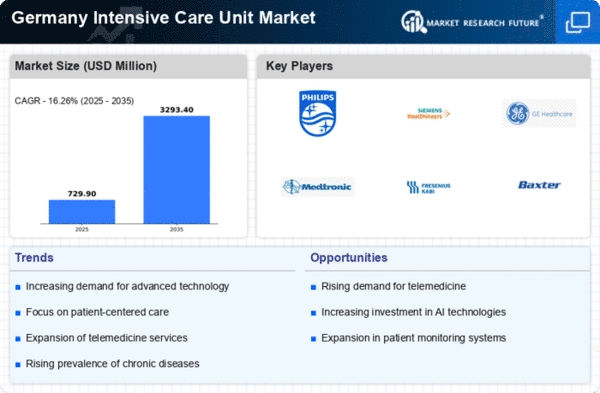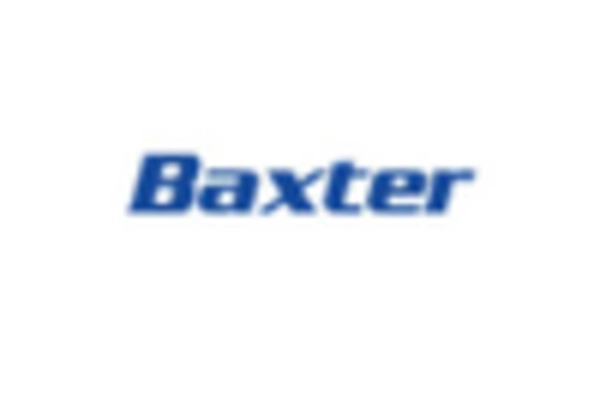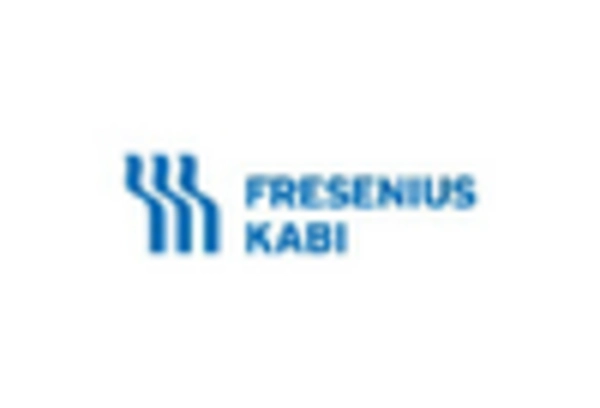Patient-Centric Care Models
The shift towards patient-centric care models is reshaping the intensive care-unit market in Germany. Healthcare providers are increasingly recognizing the importance of involving patients and their families in care decisions. This approach fosters better communication and enhances patient satisfaction. Evidence indicates that hospitals adopting patient-centric models report improved recovery rates and reduced lengths of stay in intensive care units. As a result, the intensive care-unit market is evolving to incorporate these models, focusing on personalized care plans that address individual patient needs. This transformation not only improves patient experiences but also positions facilities to respond more effectively to the diverse requirements of their patient populations.
Government Initiatives and Funding
Government policies and funding initiatives play a crucial role in shaping the intensive care-unit market in Germany. The German healthcare system allocates substantial resources to enhance critical care services, with funding directed towards upgrading facilities and technology. Recent data suggests that public spending on healthcare has increased by approximately 5% annually, reflecting the government's commitment to improving healthcare infrastructure. This financial support enables hospitals to expand their intensive care units, invest in advanced medical equipment, and recruit specialized personnel. Consequently, these initiatives not only improve patient care but also stimulate growth within the intensive care-unit market, ensuring that facilities can meet the rising demand for critical care.
Technological Integration in Healthcare
The integration of advanced technologies in healthcare significantly impacts the intensive care-unit market. Innovations such as telemedicine, artificial intelligence, and advanced monitoring systems enhance patient care and operational efficiency. In Germany, hospitals are increasingly adopting these technologies to improve patient outcomes and streamline processes. For instance, the use of AI-driven analytics in intensive care units can lead to better decision-making and resource allocation. Reports indicate that hospitals utilizing advanced monitoring systems have seen a reduction in patient complications by up to 15%. This technological evolution not only enhances the quality of care but also positions the intensive care-unit market for substantial growth as facilities seek to implement these innovations.
Rising Demand for Critical Care Services
The increasing prevalence of chronic diseases and acute medical conditions in Germany drives the demand for intensive care-unit market services. As the population ages, the incidence of conditions requiring intensive monitoring and treatment rises. Reports indicate that approximately 20% of hospital admissions in Germany involve patients needing intensive care. This trend necessitates the expansion of intensive care units to accommodate the growing patient load, thereby influencing the market dynamics. Furthermore, the healthcare system's focus on improving patient outcomes and reducing mortality rates propels investments in intensive care facilities. The intensive care-unit market must adapt to these demands by enhancing capacity and capabilities to ensure timely and effective care.
Increasing Focus on Staff Training and Development
The intensive care-unit market in Germany is witnessing a heightened emphasis on staff training and development. As the complexity of patient care increases, the need for highly skilled healthcare professionals becomes paramount. Hospitals are investing in continuous education and specialized training programs for intensive care staff to ensure they are equipped with the latest knowledge and skills. This focus on professional development is essential for maintaining high standards of care and improving patient outcomes. Data suggests that hospitals with robust training programs experience a 10% decrease in adverse events. Consequently, the commitment to staff development not only enhances the quality of care but also strengthens the overall capacity of the intensive care-unit market.

















Leave a Comment